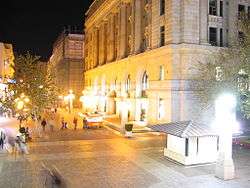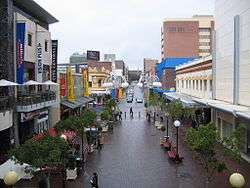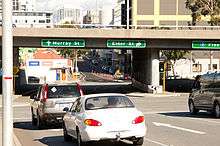Murray Street, Perth
Coordinates: 31°57′08″S 115°51′28″E / 31.952326°S 115.857847°E


Murray Street is one of four main east-west roads within the Perth central business district.
History
The street, the central portion of which has become a pedestrian mall, was named after Sir George Murray, Secretary of State for War and the Colonies from 1828 to 1830.
It is the one main road in Perth that has an eastern ending at a church - the Roman Catholic St Mary's Cathedral; the other major churches in the CBD are on the sides of the city streets.
The mall was created later than the Hay Street mall [1] and its central section had no hotels whereas Wellington, Hay and St Georges Terrace have.
The number of historic arcades linking with the Hay Street mall is significant compared to other parts of the CBD.
The western and eastern ends of the street have had significant changes in land use compared to the central section.
Shops and malls

The strip has many popular shops lining the street including flagship outlets for department stores such as Myer, David Jones, Woolworths and Target. Recent development along Murray Street has seen the addition of a number of both national and international retailers including - Nespresso, Swarovski, G-Star Raw, Quiksilver, General Pants Co., Aquilla, Industrie, Margaret River Chocolate co., Hurley, Pandora and many more. In addition to this development is now under way at the carillon centre that will see the addition of Zara to the Mall.
East Precinct
The Murray Street East Precinct includes the heritage listed area between Pier Street and Victoria Square. Notable buildings/features within the heritage precinct include;
- Young Australia League Building and House, a three storey rendered masonry and concrete building in the Inter-War Free Classical style (45 Murray Street) and adjacent two storey rendered and painted brick and iron roof house in the Federation Queen Anne style (55 Murray Street), has cultural heritage significance for the following reasons: the place has been associated with the activities of the Young Australia League from the time of purchase by the League in 1920/1921 and is associated with the founder of the Young Australia League, J.J. Simons, and with other prominent West Australians who were members of the organisation including State Premier Sir Walter James and prominent architect Lionel Boas whose architectural firm Oldham Boas was responsible for the design of the Young Australia League Building. It is also associated with the thousands of young people who took part in the programmes of the League; the Young Australia League Building is representative of the Young Australia League philosophy and a way of life based on the expression of Australian nationalism and has been associated with the development of youth organisations in Australia and overseas; the Young Australia League building is a rare example of the Inter-War Free Classical style enhanced by an unusual facade with a two-storey colonnade, semi-enclosed court and strong vertical detailing; the house, currently home to PHC Projects Management Consultants,[2] is a simple example of a two storey late nineteenth century residential building, is the only residential style building in the Murray Street East Precinct and a rare example of a substantial late nineteenth century house in central Perth; the house was the home of a prominent member of the Roman Catholic community, philanthropist, property investor and politician Timothy Quinlan who, together with his father-in-law, Daniel Connor, invested in significant land holdings in central Perth which became known as the Connor-Quinlan Estate; the place forms an important component of the Murray Street East Precinct, which extends from Pier Street to Victoria Square, and the Young Australia League Building defines the corner of Murray Street and Irwin Street.
- Former Government Printing Office Building (78 Murray Street), now the Curtin Graduate School of Business.
Accessibility
The Murray Street mall is directly connected to the Perth railway station by an entry at the west end of the mall, and via Forrest Place to the original Perth railway station and the Museum of Western Australia. Parking garages are also located nearby.
See also
Notes
- ↑ Central Murray Street upgrading (1988) prepared by Central Murray Street Upgrading Study Group ; produced by Planning Department, City of Perth
- ↑ http://www.phcprojects.com.au/
External links
| Wikimedia Commons has media related to Murray Street, Perth. |
- 1950s photo of Murray Street by Frank Hurley at the National Library of Australia
- Closer view of Murray Street on Google Maps